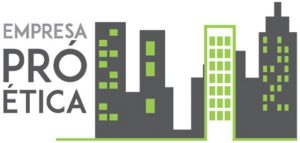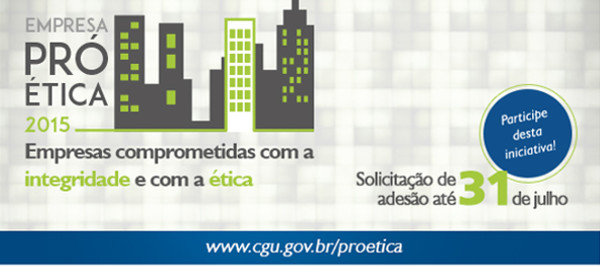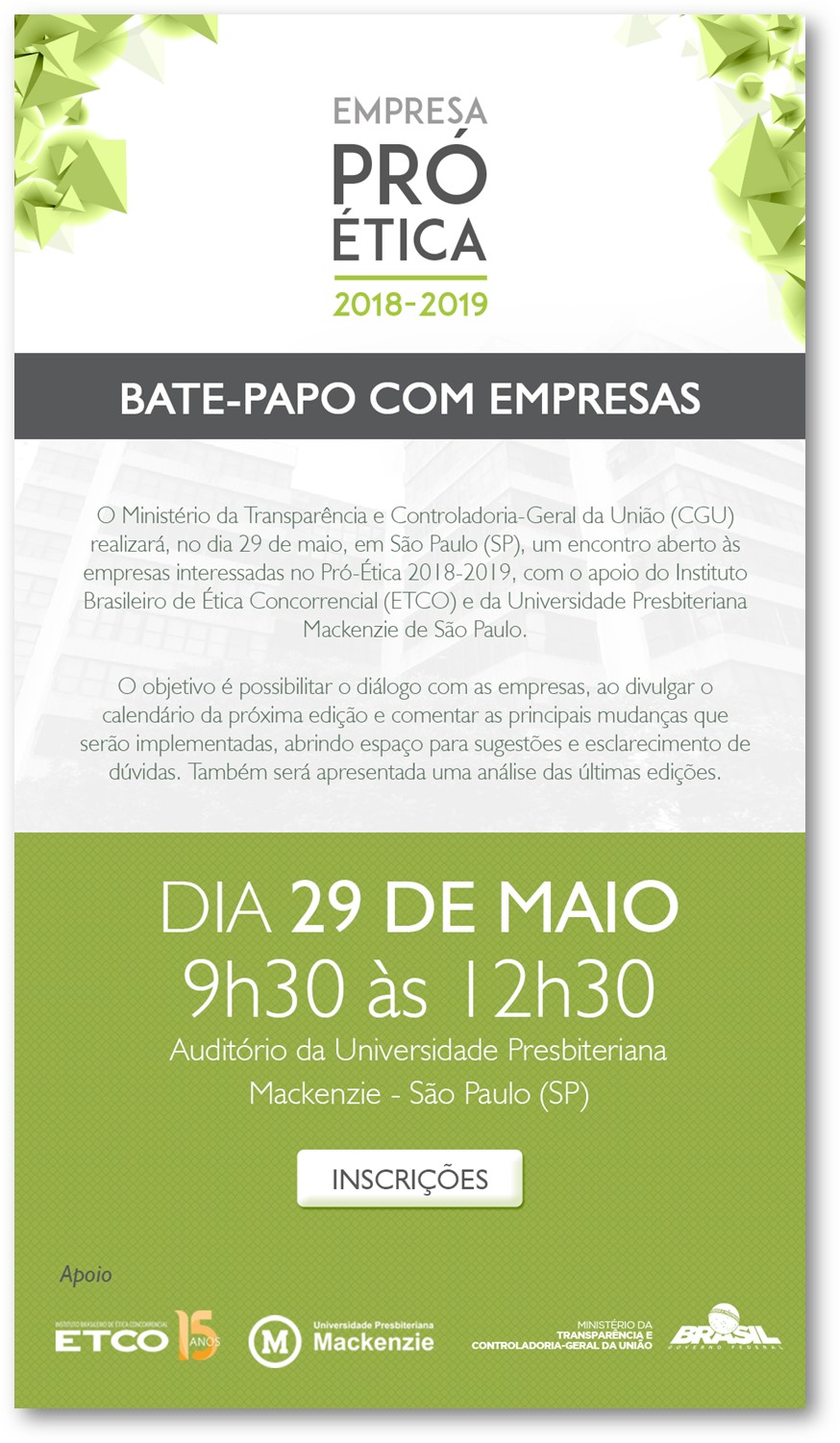Tag: Pro Ethics
CGU publishes list of companies approved in Pró-Ética 2017
23 companies were recognized as integral to the relationship between public and private sectors
The Ministry of Transparency and the Comptroller General of the Union (CGU) discloses, this Wednesday (6), the 23 companies approved in the 2017 edition of the Pro-Ethics. The companies were recognized, by relevant government and civil society bodies, as integral and ethical in their relations between the public and private sectors. The announcement was made during the 4th Clean Company Law Conference, in Brasília (DF).
>>> Check out the presentation by the CGU Minister
The winners this year are: 3M do Brasil, ABB Ltda., Alubar Metais e Cabos SA, Electricity Trading Chamber (CCEE), Chiesi Farmacêutica Ltda., CPFL Energia SA, Duratex SA, Elektro Redes SA, Enel Brasil SA, Ernst & Young Auditores Independentes S / S, Fleury SA, GranBio Investimentos SA, GranEnergia Investimentos SA, ICTS Global Risk Management Consulting Services Ltda., Itaú Unibanco Holding SA, Natura Cosméticos SA, Neoenergia SA, Nova / sb Comunicação Ltda. , Radix Engenharia e Desenvolvimento de Software SA, Siemens Ltda., Souza Cruz Ltda., Tecnew Consultoria de Informática Ltda. and Unimed Belo Horizonte Medical Work Cooperative.

Of these, 15 are large companies; seven mediums and a small one. With regard to the sector in which it operates, the distribution is found in: transformation industries (8), electricity and gas (5), scientific activities (3), human health and social services (2), financial activities (2), activities administrative (1), information and communication (1) and construction (1).
Pró-Ética, a pioneering initiative in Latin America, was created by CGU in 2010 in partnership with the Ethos Institute. The objective is to encourage companies to adopt the policies and actions necessary to create a healthy environment, which reduces the risks of fraud and corruption.
Record inscriptions
Registrations for Pro-Ética 2017 took place between February and May this year. The number of enrollment requests was a record for the second consecutive year, with an increase of 92% over the previous edition. Of these, 198 sent the completed questionnaire. After preliminary analysis by the management committee, 171 fulfilled the admissibility requirements and had their respective compliance programs evaluated - a number 131% higher than 2016.
The Pro-Ética evaluation questionnaire is separated by area: commitment from top management and commitment to ethics; policies and procedures; communication and training; reporting and remediation channels; risk analysis and monitoring; and transparency and accountability in political and social financing. The company that reaches a score equal to or greater than 70 points (out of a maximum of 100) and, cumulatively, reaches a minimum of 40% in all areas of the questionnaire will be able to compose the Pro-Ethics list.
After completing the questionnaire, it is necessary to wait for the evaluation of the management committee of Pró-Ética, composed of the National Confederation of Industries (CNI), Brazilian Federation of Banks (Febraban), BM&F Bovespa, Ministry of Development Industry and Commerce (MDIC) , Brazilian Export and Investment Promotion Agency (Apex), Institute of Independent Auditors of Brazil (Ibracon), Brazilian Service of Support to Micro and Small Enterprises (Sebrae) and, recently, Brazilian Institute of Competitive Ethics (ETCO).
Of the winners in this edition, 16 also appear in the list of winners last year: 3M do Brasil, ABB Ltda., Electric Energy Trading Chamber (CCEE), Chiesi Farmacêutica Ltda., Duratex SA, Elektro Redes SA, Enel Brasil SA, GranBio Investimentos SA, ICTS Global Risk Management Consulting Services Ltda., Itaú Unibanco Holding SA, Natura Cosméticos SA, Neoenergia SA, Nova / sb Comunicação Ltda., Radix Engenharia e Desenvolvimento de Software SA, Siemens Ltda. and Tecnew Consultoria de Informática Ltda.
Voluntary commitment and benefits
The company included in Pró-Ética is not granted different treatment in its relations with the Public Administration. It is a commitment to business ethics, voluntarily assumed by corporations, which indicates that the company strives to put in place internal measures that reduce the probability of the occurrence of illicit acts and deviations and, when they occur, guarantee the detection and interruption of these acts, in a quick way, and the remedy of their adverse effects.
Among the benefits for companies participating in the initiative are: public recognition of their commitment to preventing and fighting corruption; positive advertising for an approved company on the list; evaluation of the Integrity Program by a specialized team; report with detailed analysis of its integrity measures and suggestions for improvement.
Increased demand
The application of the legislation by CGU, in the investigation and punishment of companies - including within the scope of Operation Lava Jato - has generated reflexes in the Brazilian business environment. The possibility of suffering financial losses (fines on billing and unfairness), in addition to possible damage to the image, when proven the practice of illicit acts against the Public Administration, caused a significant increase in the demand of companies for guidance on how to implement measures of integrity and transparency in the corporate environment.
Another factor that may have caused in 2017 the significant increase in the number of companies interested in Pró-Ética was the reinforcement in the dissemination of the initiative. During the months of March and April, the then Minister of Transparency, Torquato Jardim, gave lectures with about a thousand businessmen, in ten capitals of the country, to present the benefits of the program and to stimulate the participation of new institutions and sectors of the economy.
The regional meetings covered the cities of Manaus (AM), Belém (PA), Belo Horizonte (MG), Goiânia (GO), Campo Grande (MS), Curitiba (PR), Porto Alegre (RS), Salvador (BA), Fortaleza (CE) and Recife (PE).
The enrollments for PRÓ ÉTICA were extended until May 5
Program promotes the adoption by the business sector of measures to prevent and combat corruption; applications will be received until April 28
Registrations for Pro-Ética 28 are open until April 2017, a program that seeks to encourage the voluntary adoption of integrity and corruption prevention measures in the business sector. All business and simple companies, foundations, associations of entities or persons and foreign companies, regularly constituted and having headquarters, branch or representation in Brazilian territory, can participate in the initiative.
Companies interested in participating in the program must complete the System Access Request Form and follow the guidelines described on the Pró-Ética website. No fee will be charged for registration, evaluation or disclosure of companies' participation, when approved, in the annual Pro-Ethics list.
Pro-Ethics
Established in 2010, Pró-Ética is the result of a combination of efforts between the public and private sectors - initially a partnership between the Comptroller General of the Union (CGU) and the Ethos Institute of Business and Social Responsibility.
The initiative seeks to encourage voluntary adoption of integrity measures by companies, through public recognition of those that, regardless of size and industry, are truly committed to preventing and fighting corruption and other types of fraud. The companies, by taking an affirmative stance towards preventing and combating illegal practices, collaborate in reducing the risks of fraud and corruption in the relations between the public and the private sector.
The Ministry of Industry, Foreign Trade and Services (MDIC), represented by the Department of Trade and Services (SCS), participates in the Pro-Ethics Management Committee. In addition to the initial partners CGU (as Executive Committee of the Committee) and the Ethos Institute, the Committee also has the participation of the National Confederation of Industries (CNI), the Brazilian Federation of Banks (Febraban), BM&F Bovespa, the Brazilian Agency for the Promotion of Exports and Investments (Apex-Brasil), Institute of Independent Auditors of Brazil (Ibracon), Brazilian Service of Support to Micro and Small Enterprises (Sebrae) and Brazilian Institute of Competition Ethics (ETCO).
The 2016 edition of Pró-Ética was attended by 195 companies of all sizes and from different branches of activity. Of the registered companies, 91 sent the evaluation questionnaire duly completed and within the stipulated deadline. After the evaluation process, 25 companies were approved and recognized as a Pro-Ethical Company 2016. The results were released during the Clean Company Law Conference in December last year.
To learn more, visit www.cgu.gov.br/assuntos/etica-e-integridade/empresa-pro-etica
Ministry of Transparency discloses companies approved in Pró-Ética 2016
 25 companies were recognized as integral to the relationship between public and private sectors
25 companies were recognized as integral to the relationship between public and private sectors
Ministry of Transparency, Inspection and Controllership-General of the Union (CGU) released, this Wednesday (16), the list of the 25 companies approved in the 2016 edition of Pro-Ethics. The companies were recognized, by relevant government and civil society bodies, as integral and ethical in their relations between the public and private sectors. The announcement was made during the 3th Clean Company Law Conference.
The winners this year are: ABB Ltda., 3M do Brasil, Alphatec SA, Banco do Brasil, Banco Santander Brasil, Electric Energy Trading Chamber (CCEE), Chiesi Farmacêutica Ltda., Companhia Siderúrgica Nacional (CSN), Dudalina SA, Duratex SA, EDP Energias do Brasil, Elektro Redes SA, Enel Brasil SA, Granbio Investimentos SA, ICTS Global, Itaú Unibanco, JLL - Jones Lang LaSalle, Microsoft Informática Ltda., Natura Cosméticos SA, Neoenergia SA, Nova / SB Comunicação Ltda. , Radix Engineering and Software Development SA, Serasa Experian, Siemens Ltda. and Tecnew Informática.
Pró-Ética, a pioneering initiative in Latin America, was created in 2010 by the Ministry of Transparency in partnership with the Ethos Institute. The objective is to encourage corporations to adopt the policies and actions necessary to create a healthy environment, which reduces the risks of fraud and corruption.
Source: Ministry of Transparency
To read the full story, click here
INTEGRITY: a great deal for your company
O Pro-Ethics it results from the combination of efforts between the public and private sectors to promote a more wholesome, ethical and transparent corporate environment in the country. The initiative consists of encouraging voluntary adoption of integrity measures by companies, through public recognition of those that, regardless of size and industry, are truly committed to preventing and combating corruption and other types of fraud. .
After undergoing a restructuring process during 2014, Pró-Ética returned, in 2015, with a new format, adapted to the changes that occurred with the approval of Law No. 12.846 / 2013, also known as the Anti-Corruption Law.
Among the main changes, we highlight the new evaluation methodology and the new form of disclosure of companies that are positively evaluated by the Management Committee.
Now the evaluation is annual and begins with a previous profile analysis of each company, followed by a questionnaire with open questions. This innovation allows a more qualitative examination of the integrity programs, as they are evaluated according to the specifics of the company, based on the assumption that an effective program must be developed to meet them.
The form of disclosure was also modified, and it started to be made through the publication of an annual list of companies approved by the Management Committee that year. Every year, an event is held to announce the list and deliver the Pró-Ética brand to approved companies.
It is also intended to disseminate the best integrity practices presented during the year, which expands the possibility of sharing good ideas and projects for companies that wish to create or improve their integrity programs and, at the same time, reinforces visibility in around Pro-Ethics companies.
Another highlight in the new Pro-Ética structure is that all companies that participate in the assessment will receive a report with a detailed analysis of their integrity measures. Thus, even that company that is not yet able to be included in Pró-Ética's annual list can take advantage of participation in this initiative to improve its integrity program in accordance with the assessment received and the best practices that will be disclosed.
Pro-Ethics Objectives
- Recognize good practices for promoting integrity and preventing corruption in companies that voluntarily adopt the desired and necessary measures to create a more integrity, ethical and transparent environment in the private sector and in its relations with the public sector;
- Make companies aware of their relevant role in tackling corruption by taking an affirmative stand for preventing and combating illegal and unethical practices and in defense of socially responsible relationships;
- Encourage, within the private sector, the implementation of measures to promote ethics and integrity and against corruption; and
- Reduce the risks of fraud and corruption in relations between the public and private sectors.
Source: CGU
To access the regulation page, click here
CGU launches new registration format for companies committed to ethics
 The Comptroller General of the Union (CGU) and the Ethos Institute today launch (7) the new format of Pró-Ética, an initiative that recognizes companies committed to integrity, transparency, prevention and combating corruption in the corporate environment and is supported by the Brazilian Institute of Competition Ethics (ETCO). Created in 2010, the register went through a restructuring process in 2014, based on changes brought about by the Anti-Corruption Law (Law 12.846 / 2013).
The Comptroller General of the Union (CGU) and the Ethos Institute today launch (7) the new format of Pró-Ética, an initiative that recognizes companies committed to integrity, transparency, prevention and combating corruption in the corporate environment and is supported by the Brazilian Institute of Competition Ethics (ETCO). Created in 2010, the register went through a restructuring process in 2014, based on changes brought about by the Anti-Corruption Law (Law 12.846 / 2013).
One of the novelties is the new evaluation methodology. From now on, each organization will be evaluated annually, based on a previous profile analysis, followed by a questionnaire with open questions. Before, the questions followed the yes or no model. The amendment aims to deepen the qualitative examination of the integrity measures adopted by companies.
Another novelty is the disclosure of the list of companies covered by the Pró-Ética brand, which will be made annually. This list will be released at an event, where the best integrity practices presented during the year will also be valued and disclosed.
ETCO supports this initiative, insofar as it collaborates for the adoption, by the private sphere, of the commitment of companies to articulate themselves as true schools of ethical behavior, through the development of internal codes of conduct and transparency
“ETCO is confident that companies can disseminate the concept that the development and implementation of codes of ethics are capable of preventing misconduct that erodes the business environment” analyzes Heloisa Ribeiro, executive editor of ETCO.
Any corporation, regardless of size and field of activity, can apply to join Pró-Ética. Membership is voluntary. Registration must be made on the Controllership website between May 7 and July 31. Applications will be evaluated by a management committee, chaired alternately by CGU and the Ethos Institute, and composed of eight more institutions from the public and private sectors recognized in the business community.
All evaluated companies will receive a report with detailed analysis of the integrity measures. Thus, even if the company is not yet able to be included in Pró-Ética's annual list, it can take advantage of the initiative to improve the integrity program. Details on the evaluation and the functioning of the register can be consulted in the Regulation.
How the assessment is made
First, the company fills out an electronic form, showing interest, on the CGU website. Then, the system access password is sent, where the profile analysis and the evaluation questionnaire for completion are available.
The responses to the profile analysis are declaratory, without the need for documentary evidence, and provide for the area of operation, structure, relationship with the Public Administration. The questionnaire, made with open questions, addresses six areas: commitment from top management and commitment to ethics; policies and procedures; communication and training; reporting and remediation channels; risk analysis and monitoring and transparency and accountability in political and social financing.
For each question, there is a score. The company must send supporting documents for each response, which will be evaluated by the management committee. The corporation that reaches a score equal to or above 70 points and, cumulatively, reaches a minimum of 40% in all areas of the questionnaire will be able to compose the Pro-Ethics list for that year. After approval, the company signs a commitment to ethics and integrity and becomes a Pro-Ethics company.
Pro-Ethics 2015
Registration period: from May 7 to July 31
Information and registration: www.cgu.gov.br
Projects and Initiatives
Electronic invoice
We contributed to the design, implementation and improvement of the Electronic Invoice project, which began to take effect in 2006. The System improved inspection, reduced tax evasion and reduced costs for tax authorities and companies.
Inspection Support Systems
We help to develop mechanisms to control the manufacture of products with high tax evasion power, such as the Beverage Production Control System (Sicobe) and the Cigarette Production Control and Tracking System (Scorpios).
Member of CNCP - National Council for Combating Piracy and Intellectual Property Offenses
The National Council for Combating Piracy and Offenses against Intellectual Property (CNCP), a collegiate and advisory body of the Ministry of Justice, aims to develop guidelines for the formulation and proposition of a national plan to combat piracy, its tax evasion. arising and offenses against intellectual property.
Underground Economy Index
ETCO believes that knowing the size of the problem is critical to tackling it. Much is said, but little is known about informality, piracy and evasion, as, as illegal activities, they are difficult to measure. In a pioneering initiative, ETCO, together with the Brazilian Institute of Economics of the Getúlio Vargas Foundation (IBRE-FGV), annually publishes the Underground Economy Index, a study that estimates the values of activities deliberately not declared to public authorities with the purpose of evading taxes.
To learn more about the Shadow Economy Index, click here
Simplification of the Tax System
Convinced that the complexity of the Brazilian tax system is one of the factors that encourage tax evasion, ETCO has contributed with concrete suggestions for greater efficiency in the payment, inspection and tax collection system. Among these proposals are the federal, state and municipal cadastral unification; the principle of full anteriority, with main ancillary obligations defined until June 30 of the previous year, subject to regulatory taxes; and the simplification of procedures for registration and registration of companies.
Special taxation regimes
One of ETCO's suggestions culminated in the promulgation of Article 146-A, resulting from Constitutional Amendment No. 42/2003. The article foresees that States, the Federal District and municipalities, in addition to the Union, institute differentiated taxation systems in order to prevent competitive imbalances caused by the actions of individuals who use the reduction of their tax costs to gain spurious competitive advantages. ETCO acts with a view to the enactment of a complementary law, essential for the application of the article.
Union of forces for the legal market
We created, in partnership with the National Forum to Combat Piracy (FNCP), the Movement in Defense of the Brazilian Legal Market, which joins forces to act in a coordinated manner in the fight against smuggling, piracy, fraud and counterfeiting of products and defends border control actions. The Movement has the support of 70 entities. Within the scope of cities, also in partnership with the FNCP, we created the Legality Movement, which unites forces between civil society, city halls, the Federal Revenue Service, the Federal Police, parliament, state agencies and the National Front of Mayors to fight, effectively and forcefully the illegal market in Brazilian cities.
Studies, seminars and publications
We sponsor dozens of research, events and books on topics related to ethics, including the Culture of Transgressions in Brazil series, which brings together contributions from great Brazilian thinkers, including the sociologist and former President of the Republic Fernando Henrique Cardoso.
International operations
We are members of committees that fight transnational illicit practices that provoke unfair competition. In 2016, we joined the Latin American Anti-Smuggling Alliance (ALAC), which brings together civil society entities and government agencies from 15 Latin American nations in the search for joint actions to stop smuggling in the region; in 2017, we started to act in this direction also with the World Trade Organization (WTO).
Recognition of ethical companies
We are part of the management committee of Pró-Ética, a recognition program for companies committed to ethics in their relations with the public sector. Pró-Ética was created in 2010 by the Ministry of Transparency, Inspection and Controllership-General of the Union (CGU) in partnership with the Ethos Institute.
Ethics for young people
To strengthen the ethical principles in the training of Brazilian students, we created the Ethics for Young People project. The initiative developed and made available to high school teachers, at the address www.eticaparajovens.com.br, a series of pedagogical activities to deal with the theme with its students in a pleasant and engaging way, stimulating critical thinking.







